The Robben Island Tour offers visitors an immersive journey through South Africa’s complex past. Guests can explore the island’s history as a place of exile and incarceration, including a visit to Nelson Mandela’s former cell. With a guided tour and hotel pickup/drop-off services, travelers can gain a deeper appreciation for the sacrifices made in the fight against apartheid. More than just a historical site, Robben Island showcases the island’s stunning natural beauty as a UNESCO World Heritage Site. Whether you’re a history buff or seeking a thought-provoking experience, this tour promises to leave a lasting impression.
Key Points
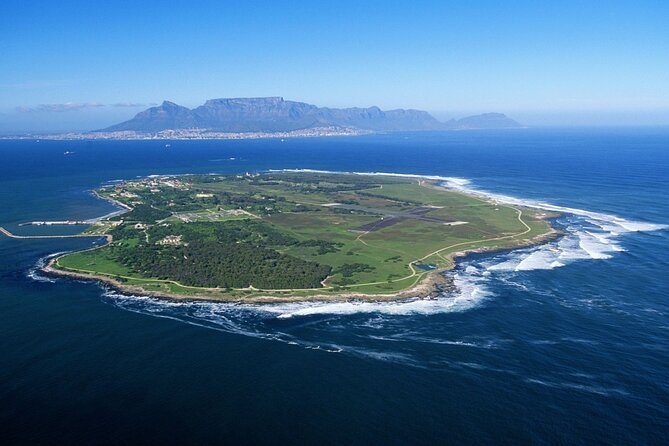
- The Robben Island tour offers a comprehensive exploration of the island’s complex history, including a visit to Nelson Mandela’s former cell.
- The tour operator provides hotel pickup and drop-off services in Cape Town, ensuring a convenient and hassle-free experience for visitors.
- The guided tour highlights the island’s significant sites, such as the limestone quarry where prisoners were forced to work, providing a powerful insight into the island’s past.
- Visitors can expect to spend approximately 3.5 hours on the full tour, which includes an immersive journey through the island’s history and the opportunity to witness its stunning natural beauty.
- While the tour is not wheelchair accessible, the tour operator aims to accommodate visitors to the best of their abilities, ensuring a meaningful and educational experience.
Overview of Robben Island Tour
The Robben Island tour offers visitors a unique opportunity to explore South Africa’s history and learn about the island’s past as a former prison where Nelson Mandela was incarcerated.
During the guided tour, guests will have the chance to visit Mandela’s former cell and gain a deeper understanding of the country’s struggle for freedom.
The tour also includes stops at other significant sites on the island, providing a rundown of its complex and often harrowing history.
With knowledgeable guides leading the way, visitors can expect to come away from the experience with a renewed appreciation for the sacrifices made in the fight against apartheid.
You can also read our reviews of more tours and experiences in Cape Town.
History of Robben Island Prison
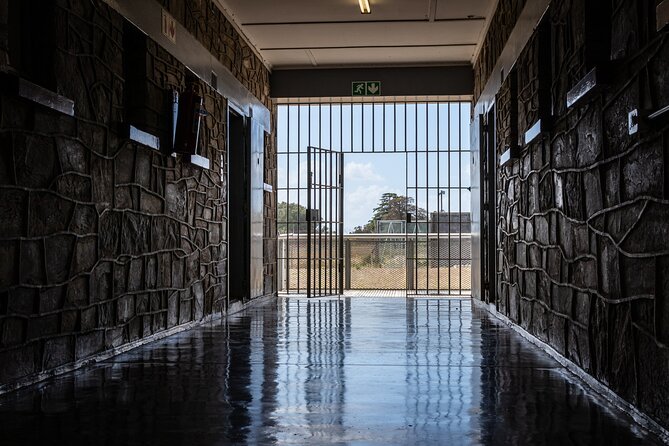
Robben Island’s history as a prison dates back to the 17th century, when the Dutch first used the island to isolate political prisoners, lepers, and other undesirables from mainland society.
Over the centuries, the island’s role as a place of incarceration evolved, and it became a maximum-security prison during the apartheid era. It was here that Nelson Mandela and other prominent anti-apartheid activists were imprisoned for decades, forced to perform hard labor in the island’s limestone quarries.
The island’s dark past has since been transformed into a symbol of resilience and the triumph of the human spirit, with its designation as a UNESCO World Heritage Site in 1999.
Nelson Mandela’s Imprisonment Experience

Nelson Mandela’s decade-long imprisonment on Robben Island profoundly shaped his unwavering resolve and leadership in the anti-apartheid movement. During his time on the island, Mandela endured harsh conditions, backbreaking labor, and restricted visitation rights. However, he used this adversity to deepen his commitment to social justice and inspire his fellow inmates. Mandela’s experience on Robben Island is a testament to the power of the human spirit and the transformative potential of perseverance.
| Year | Key Events |
|---|---|
| 1964 | Mandela sentenced to life imprisonment |
| 1977 | Mandela’s mother and son die, but he is denied permission to attend their funerals |
| 1982 | Mandela transferred to Pollsmoor Prison |
| 1988 | Mandela moved to a private house on the grounds of Victor Verster Prison |
Guided Tour of the Island
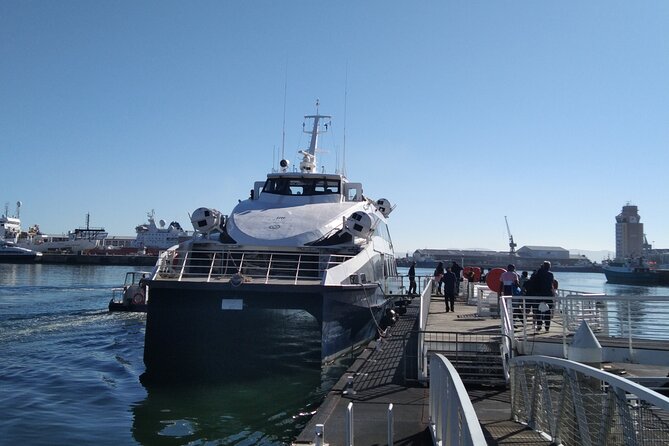
Visitors on the Robben Island tour can explore the island’s historical sites, learning firsthand about the harsh conditions that Nelson Mandela and other political prisoners endured during their incarceration. Led by knowledgeable guides, the tour takes guests through the island’s maximum-security prison, including Mandela’s former cell.
Travelers can visualize the bleak living quarters, sparse exercise yard, and limestone quarry where prisoners were forced to toil. The tour evokes powerful emotions through:
- Seeing Mandela’s cramped, bare cell.
- Witnessing the isolation of the island itself.
- Understanding the brutality of the apartheid regime.
- Reflecting on the resilience of the human spirit.
This immersive experience provides a profound connection to South Africa’s tumultuous history.
Highlights of the Tour Route
The tour route showcases the island’s multifaceted history, taking visitors through key landmarks that exemplify the harsh realities of the apartheid era.
One of the primary highlights is the Maximum Security Prison, where guests can step inside the cramped cell that once confined Nelson Mandela during his 18-year incarceration.
The tour also visits the lime quarry, where prisoners were forced to toil under the relentless sun, and the desolate island hospital, a grim reminder of the medical neglect endured by inmates.
Along the way, knowledgeable guides share poignant stories, bringing the island’s haunting past to life. The tour provides a powerful and sobering glimpse into a chapter of South Africa’s history that forever changed the course of the nation.
- Cape Town Township Tour Including Langa Township and Bo-Kaap
- Constantia Wine Walk Storytelling Vineyard Tour With Lunch
- Cape Town Helicopter Tour: Atlantic Coast
- Camps Bay and Hout Bay Helicopter Tours From Cape Town
- Private Cape Point Penguins Tour – a Full Day of Exploring the Cape Peninsula
- Cape Point Sightseeing Tour Including Cape of Good Hope Full Day From Cape Town
Practical Information for Visitors
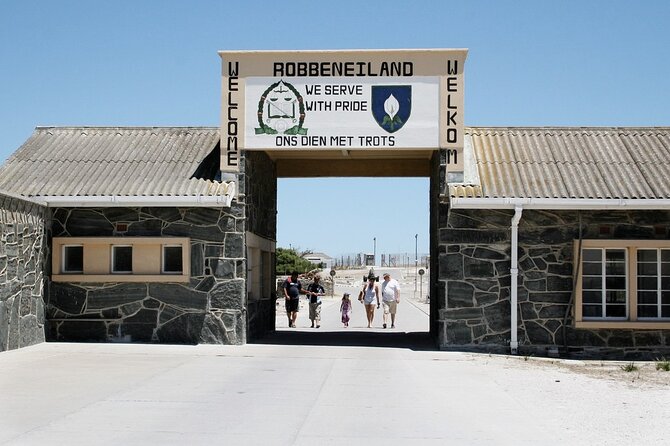
Booking the Robben Island tour is straightforward, as the tour operator provides convenient hotel pickup and drop-off services in Cape Town.
Once on the island, visitors can expect a guided tour that covers the site’s poignant history, including the infamous Maximum Security Prison where Nelson Mandela was incarcerated.
The tour highlights include:
- Visiting Mandela’s former prison cell, a powerful reminder of his long struggle for freedom.
- Exploring the limestone quarry where prisoners were forced to work in harsh conditions.
- Learning about the island’s dark past as a place of exile, banishment, and isolation.
- Witnessing the stunning natural beauty of the island, a UNESCO World Heritage Site.
Cancellation and Refund Policy
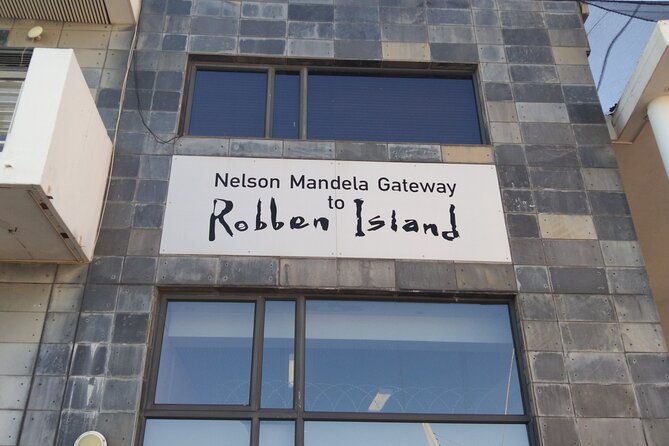
One can’t make changes to the Robben Island tour booking, as it’s a non-refundable arrangement.
If a tour is canceled due to inclement weather, visitors will be eligible for a full refund. The tour operator takes weather conditions seriously, as the safety of guests is their top priority.
If a tour is canceled, the operator will work closely with visitors to reschedule or provide a full refund in a timely manner.
Guests are encouraged to check weather forecasts and plan accordingly, as no-shows or late arrivals won’t be eligible for a refund.
The cancellation policy is straightforward, ensuring a hassle-free experience for all who embark on the Robben Island tour.
Transportation and Accessibility Details
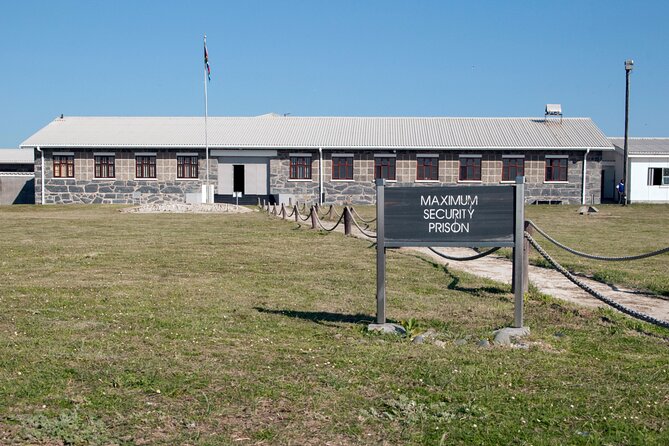
Getting to Robben Island is a straightforward process, as the tour operator provides hotel pickup and drop-off services in Cape Town. However, the tour itself isn’t wheelchair accessible, limiting participation for some visitors.
Travelers can expect to spend approximately 3.5 hours on the full excursion, which includes the ferry ride to and from the island.
The tour experience offers:
- An immersive journey into South Africa’s complex history.
- A chance to explore the island’s iconic landmarks.
- Insights into Nelson Mandela’s imprisonment and resilience.
- Breathtaking views of the Cape Town coastline.
While the logistics are well-organized, the accessibility challenges may impact some guests. The Robben Island tour remains a powerful and educational experience.
Frequently Asked Questions
What Time Does the Tour Typically Start and End?
The Robben Island tour typically starts in the morning and ends in the early afternoon, lasting approximately 3.5 hours. The exact starting and ending times may vary depending on factors like the ferry schedule and tour group size.
Are There Restroom Facilities Available During the Tour?
Yes, there are restroom facilities available during the Robben Island tour. Visitors can use the restrooms both on the ferry to the island and at various locations throughout the guided tour of the island.
Can We Bring Our Own Food and Drinks on the Tour?
Yes, visitors can bring their own food and drinks on the Robben Island tour. The tour itinerary allows for free time, giving travelers the opportunity to enjoy their packed meals and refreshments during the visit.
Is There a Discount for Students or Senior Citizens?
Yes, the Robben Island tour offers discounted tickets for students and senior citizens. Visitors can simply present valid ID when purchasing tickets to receive the reduced price.
Can We Take Photos Inside the Prison Cells?
Visitors are generally allowed to take photos inside the prison cells on Robben Island tours. However, some restrictions may apply, so it’s best to check with the tour guides upon arrival to ensure compliance with any rules or guidelines.
Recap
The Robben Island Tour provides visitors with a powerful and immersive experience, allowing them to explore South Africa’s complex history.
Guests can walk in the footsteps of Nelson Mandela, learn about the island’s past as a place of exile and incarceration, and witness its stunning natural beauty.
This comprehensive tour offers a unique opportunity to gain a deeper appreciation for the sacrifices made in the fight against apartheid.
More Tours in Cape Town
More Tour Reviews in Cape Town
Not for you? Here's more things to do in Cape Town we have recnetly reviewed
- Signal Hill Romantic Sunset Tour in Cape Town
- MTB Table Mountain – Constantia Morning Tour
- Best of Cape Town Full-Day Private Tour With Table Mountain
- Private Cycling Tour of the Cape Peninsula From Cape Town
- Afternoon High Tea at Mount Nelson Hotel From Cape Town
- Whale Watching Hermanus – Boat Base
- Best of Cape Town Cape Point and Wineries Combined Private Tour
- Table Mountain, Penguins Colony and Cape of Good Hope Small Group Shared Tour
- 5 Day Garden Route and Addo Safari – Best of South Africa Small Group Tour
- Private Half Daytour:Cape Winelands, Stellenbosch From Cape Town
- India Venster: Sensational Half-Day Route up Table Mountain
- 3 Day Garden Route Safari
